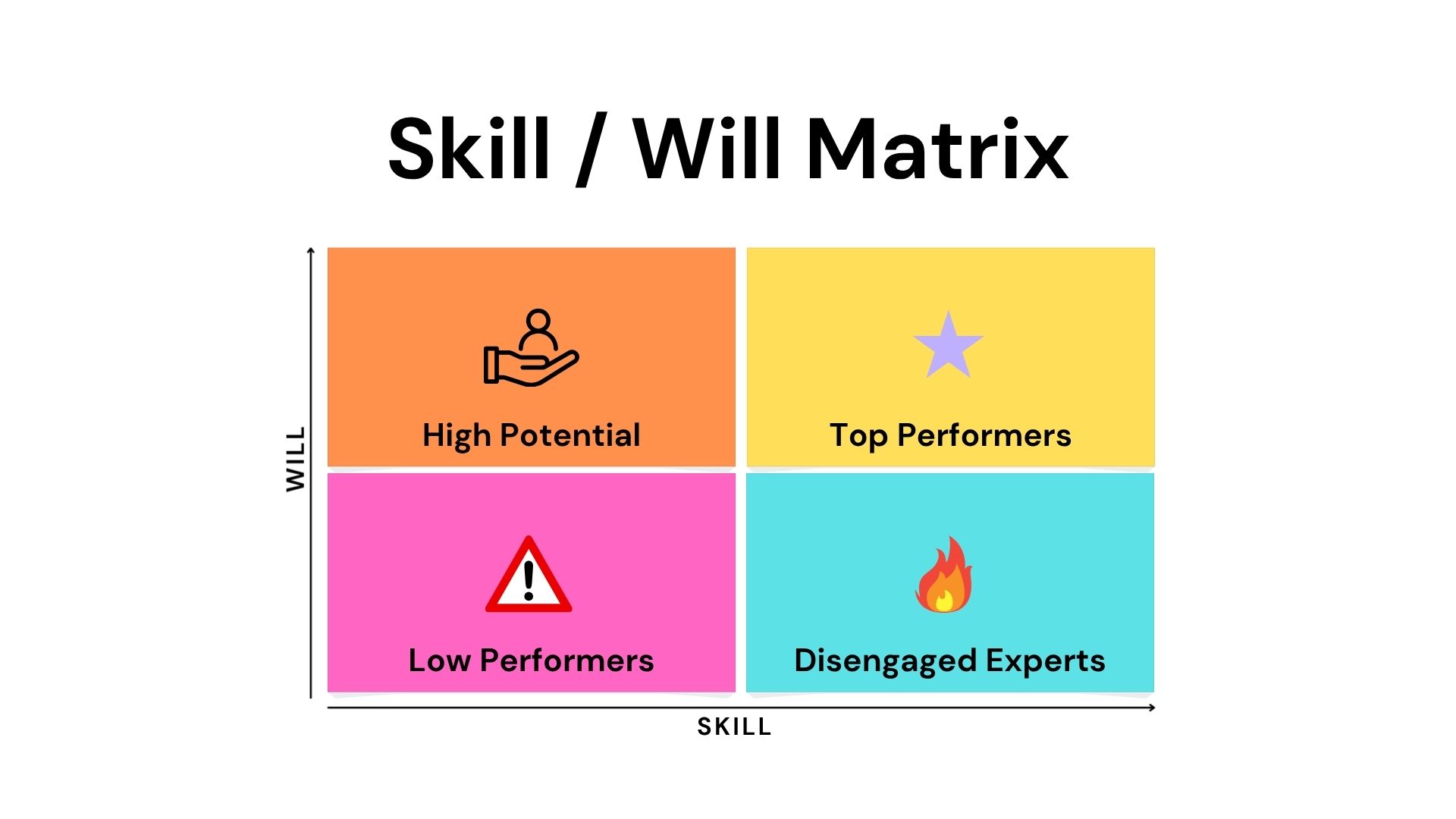In this article we’ll look at a thought-provoking tool often used by team leaders right to the top CEO positions.
The Skill–Will Matrix is a practical leadership and coaching tool that helps managers, team leaders and educators understand how best to support and develop individuals based on two key factors: their skill (competence to perform a task) and their will (motivation to perform it).
By plotting individuals on the matrix, leaders can tailor their approach to suit different needs from providing clear direction and training for those with lower skill levels, to empowering high performers who are both skilled and motivated.
The matrix is widely used in performance management, coaching, mentoring and learning and development contexts. It’s especially useful when:
- Delegating tasks or projects to team members.
- Managing performance or engagement challenges.
- Planning personal development or training programmes.
- Supporting career growth and succession planning.
The main benefits of the Skill–Will Matrix include:
- Helping leaders adapt their style to bring out the best in each individual.
- Encouraging focused and supportive development conversations.
- Increasing employee engagement by matching responsibility with readiness.
- Building a stronger, more self-reliant and motivated team.
The Skill–Will Matrix provides a clear framework for understanding people’s readiness to perform and for guiding them effectively toward greater competence and commitment.

How to Use It
- Assess individuals or teams based on their skill and will relative to a specific task or goal. We use a Motivational Map to assess will at work.
- Plot them on the matrix.
- Tailor your leadership style accordingly, moving people diagonally up and right over time (towards high skill, high will).
- Review regularly as skill or motivation can change with new challenges or circumstances.
Tailoring Your Leadership Style
A. High Skill / High Will → “Top Performers”
- Keyword: Empower
- Profile: Self-starter, expert, reliable performer.
- Leadership approach: Delegate authority; focus on stretch goals and strategic involvement.
- Development actions:
- Offer autonomy and recognition.
- Involve them in mentoring or innovation projects.
- Avoid micromanaging.
B. High Skill / Low Will → “Disengaged Experts”
- Keyword: Involve
- Profile: Capable but disengaged or demotivated.
- Leadership approach: Use coaching to understand underlying causes (e.g., lack of challenge, poor recognition, team friction).
- Development actions:
- Discuss career goals and align work with interests.
- Recognise achievements and provide fresh challenges.
- Build trust through collaboration and listening.
C. Low Skill / High Will → “High Potentials”
- Keyword: Guide
- Profile: Enthusiastic learner; motivated but inexperienced.
- Leadership approach: Provide hands-on guidance, feedback and structured learning opportunities.
- Development actions:
- Pair with a mentor or experienced peer.
- Give early wins and celebrate progress.
- Offer clear instructions and regular feedback loops.
D. Low Skill / Low Will → “Low Performers”
- Keyword: Direct
- Profile: Struggling and unmotivated; requires close management.
- Leadership approach: Be clear, specific and supportive. Set expectations, monitor progress, reinforce small improvements. Be mindful of possible exit.
- Development actions:
- Identify and remove barriers (skills gaps, personal issues, unclear goals).
- Set short-term achievable goals with immediate feedback.
- Recognise effort, not just results, to start rebuilding confidence.
Summary
The Skill–Will Matrix offers a simple yet powerful way to understand what people need to perform at their best. By assessing both ability and motivation, leaders can choose the right approach from directing and guiding to involving and empowering. Whether used in team management, coaching or professional development, the matrix helps create more targeted support, stronger engagement and better overall performance. Ultimately, it encourages a culture where individuals grow in both skill and confidence, contributing to the success of the whole team.
